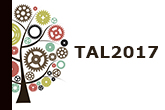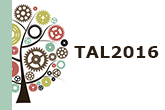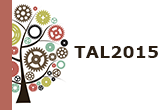Welcome to the website of TAL2018
The overall focus of the conference is active teaching and learning which has been chosen as the underlying principle of education at SDU. This conference is designed to help practitioners inspire each other, disseminate knowledge and share experiences on how to facilitate students’ active participation and learning in accordance with the underlying principles of education at SDU.
Time and place: Tuesday 6 November 2018, 9:00-16:00 at the University of Southern Denmark (Odense).
CONFERENCE MATERIAL:
- Detailed programme, subject to minor changes
- Short communications and poster abstracts
- Workshop abstract
- Poster session abstract (Experts in Team Innovation)
Video recordings:
Welcome to the TAL2018 Conference:
Keynote 1 TAL2018: Collaborative Learning in Higher Education: Relevant Dimensions:
Keynote 2 TAL2018: Reflections and New Directions:
Looking Ahead to the TAL2019 Conference:
Keynotes Nikol Rummel og Anne Deiglmayr's ppt-presentations and handout:
- Collaborative Learning in HE: Relevant Dimensions
- Collaborative Learning in HE: Reflections and New Directions
- Handout: A Framework for (CS)CL Support
Registration: The conference is now fully booked, but we will be happy to write you on the waiting list. Please send an email to agpetersen@sdu.dk stating your name, title, institution and department. Please note that there will be a fee of 500 DKK in case of no-show at the conference without cancellation.
The target group of the conference is primarily staff at SDU and University Colleges in the Region of Southern Denmark. The conference is, however, open to all interested colleagues, and we welcome abstracts and registrations from staff at other national and international universities and educational institutions.
The aims of the conference are to give the participants the opportunity
- to share, document, demonstrate, substantiate, and analyse their own examples of active teaching and learning
- to be inspired to further refine their own current practice or to develop new practices within active teaching and active learning
Conference theme:
This year the conference has a special focus on Collaborative Learning which, may be defined as ‘a coordinated, synchronous activity that is the result of a continued attempt to construct and maintain a shared conception of a problem’ (Rochelle and Teasley, 1995). However, this definition is contested and TAL2018 will provide an opportunity to collect and disseminate different interpretations and practices of collaborative learning.
The reasons for focusing on collaborative learning are wide ranging and include its potential contributions to learning (Dillenbourg, 1999) and to learner motivation (Slavin, 2014). Collaborative learning opportunities can contribute to intercultural understanding (Killick, 2016; Leask, 2009) and social cohesion (Slavin, 2014). It is also applicable in diverse subject pedagogies and can be experienced through a range of teaching and learning formats: face to face, blended and online learning. The NMC Horizon Report for Higher Education (2017) identifies collaborative learning as a driver for the adoption of e-learning technology.
At TAL2018 we shall:
- explore the concept of collaborative learning, and why and how this learning approach is practised
- disseminate knowledge on different collaborative learning approaches and guidelines for design
- provide insight into the opportunities and possible limitations implied by the approach
- stimulate reflections on teachers’ and students’ pedagogic and intercultural experiences of collaborative learning.
TAL2018 will include:
- Keynote lectures and plenary keynote/discussion - focusing on collaborative learning, by:
- Prof. dr. Nikol Rummel , Ruhr-Universität Bochum (Pedagogic Psychology)
- Dr. phil. Anne Deiglmayer, ETH Zürich
- Parallel sessions with short communications, posters and workshops on active teaching and learning and collaborative learning
TAL2018 welcomes all teachers, educational developers, researchers, librarians and students, to contribute practical examples, experiences and research as a short communication or poster on any of the following parallel sessions’ themes:
Main theme - Active Teaching and Learning
- Examples of active teaching and learning
Special focus – Collaborative Learning
- Students’ shared learning outcome
Examples of collaborative learning activities where students are working together towards a shared outcome
(e.g. students work in groups and complete a group activity/assignment /poster/presentation/…).
- Students’ individual learning outcomes
Examples of cooperative learning activities where students are working together towards individual outcomes
(e.g. students work in groups and complete individual assignments/posters/presentations/…).
- E-learning tools and students’ learning
Examples of how e-learning tools are integrated into collaborative or cooperative learning activities and how they contribute to learning.
- Intercultural collaborative or cooperative learning
Examples of intercultural collaborative or cooperative learning activities where diverse groups of students are working together either towards a shared outcome or individual outcomes.
- Innovation and entrepreneurship
Examples of how collaborative learning activities can be incorporated into teaching innovation and/or entrepreneurship
Language: Speakers and plenary debates will be in English. There will be parallel sessions in both English and Danish.
Format:
- In the short communication sessions, each presenter will have 10 minutes to share an experience and reflections, followed by 10 minutes of discussion.
- Poster presentations will be in a series of 4 posters with 5 minutes' individual presentations followed by a 20-25-minute joint discussion of the 4 posters.
- Workshops will last 45 minutes.
Conference proceedings: Presenters will subsequently have the possibility of having their contributions included in the conference proceedings.
Programme committee: The Centre for Teaching and Learning at SDU. If you have questions regarding the contents of the conference please contact:
- Donna Hurford, dhu@sdu.dk
- Lotte Dyhrberg O'Neill, ldo@sdu.dk
- Christopher Kjær, ckjaer@sdu.dk
For questions of a practical nature please contact Anne Grete Petersen, agpetersen@sdu.dk
References:
Dillenbourg P. (1999) What do you mean by collaborative learning? In P. Dillenbourg (Ed) Collaborative-learning: Cognitive and Computational Approaches (pp.1-19). Oxford: Elsevier.
Doolan, M. (2013) A Pedagogical Framework For Collaborative Learning in a Social Blended E-Learning Context Increasing Student Engagement and Retention in e-Learning Environments: Web 2.0 and Blended Learning Technologies. Wankel, C. & Blessinger, P. (eds.). Emerald, p. 261-286 (Cutting-Edge Technologies in Higher Education; vol. 6G)
Slavin, R. (2014) Cooperative Learning and Academic Achievement: Why Does Groupwork Work? anales de psicología, 2014, vol. 30, nº 3 (octubre), 785-791
Kaendler, C., Wiedmann, M., Rummel, N., & Spada, H. (2015). Teacher competencies for the implementation of collaborative learning in the classroom: A framework and research review. Educational Psychology Review, 27(3), 505-536.
Deiglmayr, A., & Spada, H. (2011). Training for fostering knowledge co-construction from collaborative inference-drawing. Learning and Instruction, 21(3), 441-451.



